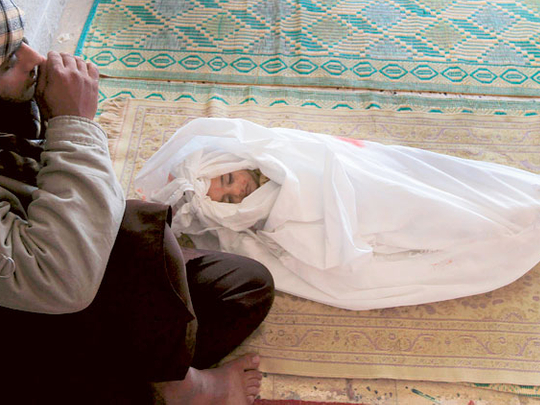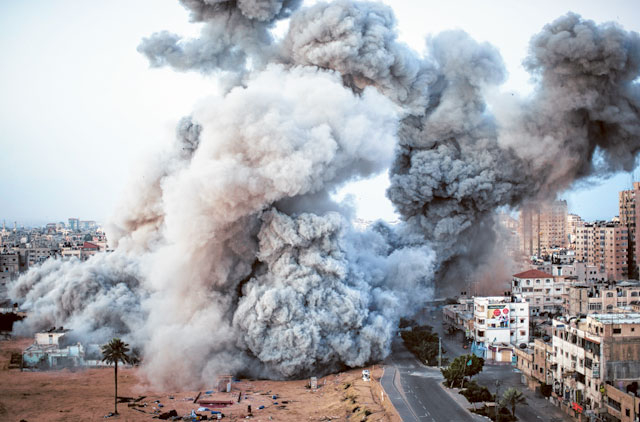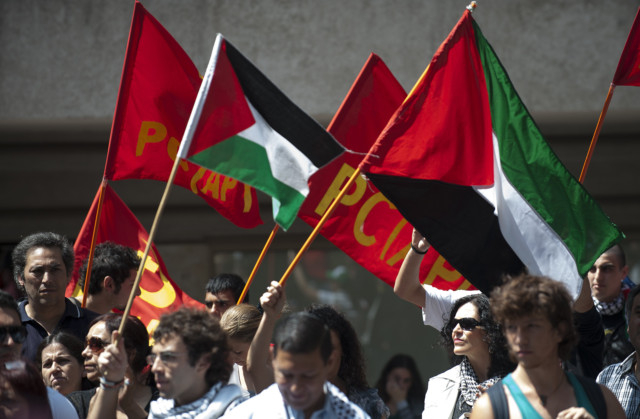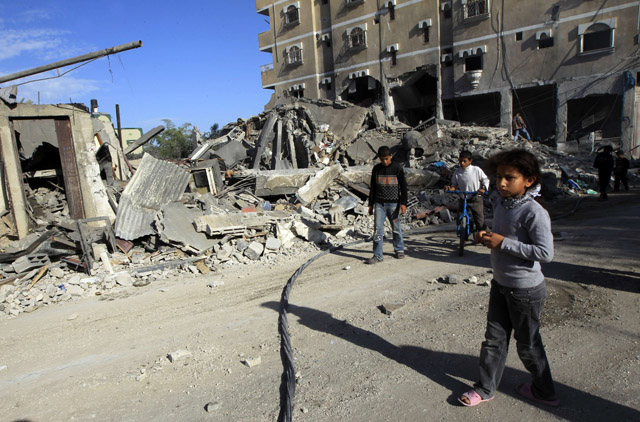
Jabaliya, Gaza Strip: Stepping over his daughter’s mangled teddy bear and pink bedroom curtains, math teacher Hossam Dadah salvaged what he could from the wreckage of his home and said he’s had enough.
Two of his children were hospitalised after Israeli airstrikes destroyed the three-storey house next door, which was owned by a Hamas official. “This has to end,” said Dadah, his black hair covered with concrete dust from the explosion. Hamas should quit while it’s ahead, he said.
Not far away in Gaza City, policeman Mohammad Abu Islam peered into the massive crater left by an Israeli strike on the city’s sports stadium and insisted that Gazans should press forward with the conflict. “We can’t stop now,” he said. “If Israel wants a long-term truce, this time there must be conditions that improve our lives, such as lifting the blockade on the borders and the sea.”
The conflicting views of ordinary Palestinians summed up the calculation now facing Hamas, the Islamist group that has been struggling for five years to find a balance between its roots as a resistance army and its responsibility for governing the Gaza Strip.
After appearing to moderate its behaviour after the last Israeli assault of Gaza four years ago, Hamas is surprising many this time with its aggressive tactics. Ignoring red lines set by Israel, Hamas aimed rockets at Tel Aviv and occupied Jerusalem for the first time, knowing such moves could trigger another ground assault on the Gaza Strip. The Israeli military said 160 rockets were fired towards Israel on Saturday. Israel’s Iron Dome defence system shot down one targeting Tel Aviv.
Israeli officials called Hamas’ actions a sign of desperation. But others see them as a strategy aimed at drawing Israel into a high-profile conflict that Hamas hopes to leverage into an Israeli concession to lift its restrictions on the movement of goods and people. “It seems to me they are going all the way to brinksmanship,” said Mukhaimar Abu Saada, political science professor at Al Azhar University in Gaza City. By creating an international crisis, its leaders hope that “at the end of this war, Hamas will be much more legitimate, politically speaking,” he said.
In the cease-fire talks in Egypt, Hamas is demanding that Israel agree to end the border blockade and promise to stop targeted killings of its leaders, a Hamas official said. Israel has not confirmed that talks are under way, or revealed its conditions for a truce. Egyptian President Mohammad Mursi said that he was working with Arab countries, Turkey, the U.S. and others on efforts to stop the fighting, but that there were no guarantees. The White House said President Barack Obama was in touch with Egyptian and Turkish officials.
If an agreement is not reached, Hamas leaders are betting that the new Egyptian government, controlled by a more friendly Islamist president, won’t stand by if Israel launches a ground invasion, Abu Saada said. It remains to be seen whether Hamas’ gamble will pay off. Egypt’s prime minister made a high-profile visit to Gaza on Friday and Tunisia’s foreign minister arrived on Saturday. “That which [Israel] was able to do previously is no longer allowed,” said Tunisian Foreign Minister Rafik Abdessalem.
But so far the strong statements from new post-”Arab Spring” governments have not been matched with strong actions. Countries such as Egypt and Tunisia, where revolutions ousted long-time strongmen, are struggling with serious internal issues, including poor economies, the tension between secular and Islamist factions and difficulties in establishing the rule of law. Some analysts say that, regardless of how sympathetic their citizens are to the Palestinian cause, they are preoccupied with their domestic problems. There is little sign that Western nations, such as the United States, are softening their negative attitude toward Hamas. The US and Israel view Hamas as a terrorist organisation, and the US has publicly blamed Hamas for starting the conflict by firing rockets into Israel.
Hamas leaders themselves have been largely silent about their aims. Most are hiding in underground bunkers to avoid Israeli airstrikes, which already have killed several top military commanders.













